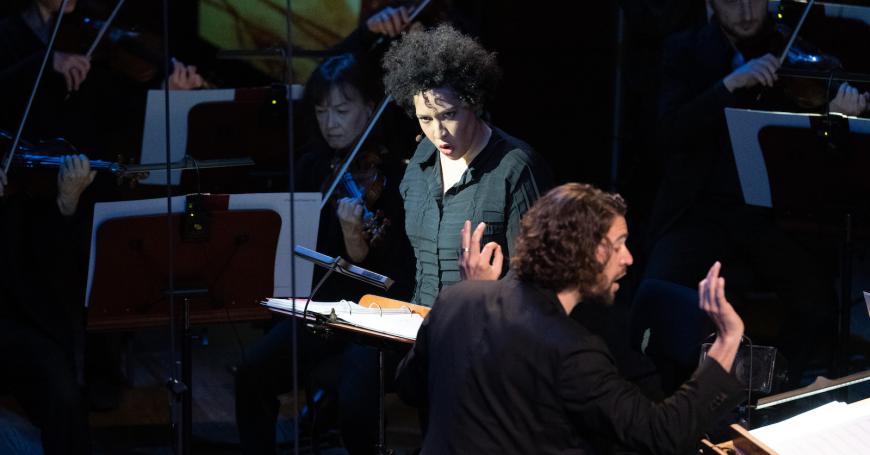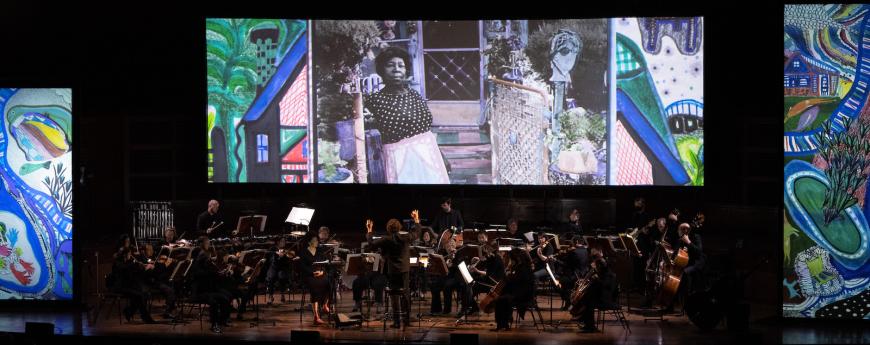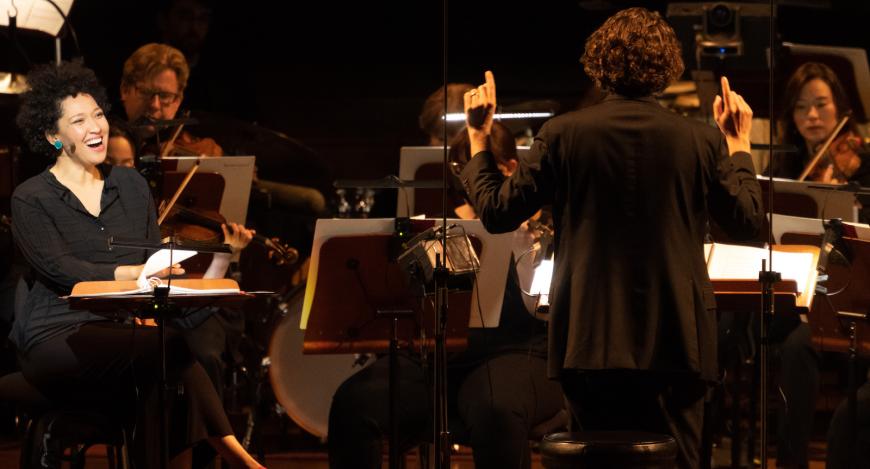
The soprano Julia Bullock has been developing “History’s Persistent Voice” as a project for several years. She presented it at New York’s Metropolitan Museum of Art in 2018, in parallel to an exhibit of self-taught Black artists. That version, performed when Bullock was an artist-in-residence at the museum, was about 50 minutes long, according to a review by Susan Brodie in Classical Voice North America.
Bullock, now one of San Francisco Symphony’s collaborative partners, brought History’s Persistent Voice to Davies Symphony Hall on May 17, giving as spectacular and exciting a recital as you might imagine. The program has expanded to 90 minutes and included two West Coast premieres as well as three world premieres. Each of the works on the program was written for Bullock, who brought to every piece flawless, magnificent vocalism and heartfelt phrasing.
All five composers in the current version of History’s Persistent Voice are, like Bullock herself, Black women. They draw on powerful sources for their music: the words of the Gee’s Bend, Alabama, quilters; songs collected after the Civil War from formerly enslaved Black people; interviews with the Black artist Thornton Dial; and more. History’s Persistent Voice also includes atmospheric videos by Hana S. Kim, all of which contributed to the shifting moods of the musical works, some of which directly reflected the subject matter of the texts.
For Bullock, the project is deeply personal, because of her heritage and because of her dedication to justice and liberation. She contributed to creating the text of several of the works on the program. History’s Persistent Voice intersperses appropriate readings among the songs, including writings by incarcerated people and interviews with the quilters. Bullock spoke, during the program, of how these things fit into the Black experience in America.
For all the seriousness of the program, and for all the sense of occasion, the recital was remarkably informal and relaxed. Bullock and conductor Christian Reif joined the string orchestra arrayed on stage with so little fanfare that you could have missed their entrance. Then the soprano started chatting about Jessie Montgomery’s Five Freedom Songs, from 2020, arrangements of songs chosen by Bullock and Montgomery from Slave Songs of the United States, a collection originally published in 1867.

These arrangements deftly combine classical impulses with a range of American vernacular styles. The first, “My Lord, What a Morning,” could have been jazz. The second in the set, “I Want to Go Home,” originated as a seven-note melody notated without rhythms. What emerged in Montgomery’s hands was a long, melismatic vocal line over a chordal accompaniment that Bullock sang with supple, improvisatory flexibility. She was clearly leading the way; Reif, who is Bullock’s husband, followed her, here and throughout the program, with impressive sensitivity and support.
Montgomery is a violinist, and her arrangements were marked by vibrant string and percussion writing. The tense edge of the violins in “Lay This Body Down” plays against Bullock’s luscious sound. In the last song, “The Day of Judgement,” the string players drum on their instruments, in and arrangement that sounded like Hollywood-style jazz of the 1930s.
Bullock herself edited the interviews with visual artists Sue Willie Seltzer and Nellie Mae Rowe that form the basis of the lyrics for Carolyn Yarnell’s two songs, I Come Up the Hard Way and ain’t my home. Yarnell is a visual artist as well as a composer, and these songs had strikingly colorful arrangements even within the constraints of a string and percussion ensemble. She made brilliant use of mallet instruments and an electric bass in I Come Up the Hard Way with an insistent beat through most of the song whose cessation yields to a beautiful melody in the strings.
Allison Loggins-Hull’s Mama’s Little Precious Thing, which sets words attributed to Willie “Ma Willie” Abrams of the Gee’s Bend quilters, left an indelible impression. The composer first builds her instrumental lines on a variant of Brahms’s famous lullaby, which emerges as a piercingly lovely violin solo. Loggins-Hull divides the strings into many parts, creating a richly textured tapestry of sounds, incorporating harmonics and pizzicato for even more sonic variety.

Pamela Z’s remarkable Quilt also draws on the words of women from the Gee’s Bend quilting collective. The composer sampled their voices for a tape and built musical motifs from their speech patterns. These motifs reflect to an astonishing extent the rhythms of Southern Black women’s speech. Bullock commented that in Quilt, the work of all of the performers was to echo and support those words. Pamela Z effectively composed that into Quilt, which has call-and-response patterns built in.
The program closed with Pulitzer Prize winner Tania León’s Green Pastures, a dissonant and deeply affecting setting of text edited from an interview with Thornton Dial. Dial’s messages — and those of León and Bullock — are clear as day, about the power of art, the power of the effort put into making art, the strength of people and of the natural world.
Bullock was scheduled to appear this fall in the world premiere of John Adams’s new opera, Antony and Cleopatra, which opens San Francisco Opera’s centennial season. As of May 20, she has withdrawn from that production owing to pregnancy. (SFO announced that Amina Edris will step into the role.) There are likely to be other opportunities to hear her as Cleopatra, because the work has three co-commissioners, including the Metropolitan Opera and two European companies. And she'll be appearing next June with SFS under Esa-Pekka Salonen.




